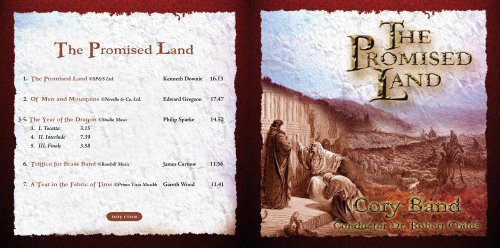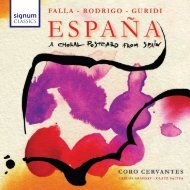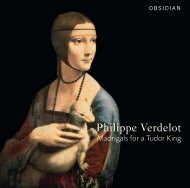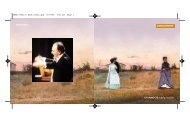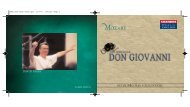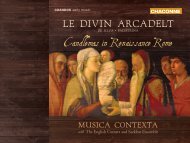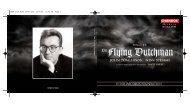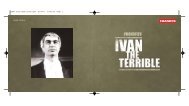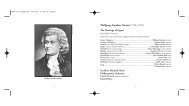The Promised Land - Chandos
The Promised Land - Chandos
The Promised Land - Chandos
You also want an ePaper? Increase the reach of your titles
YUMPU automatically turns print PDFs into web optimized ePapers that Google loves.
<strong>The</strong> <strong>Promised</strong> <strong>Land</strong><br />
1. <strong>The</strong> <strong>Promised</strong> <strong>Land</strong> ©SP&S Ltd. Kenneth Downie 16.13<br />
2. Of Men and Mountains ©Novello & Co. Ltd. Edward Gregson 17.47<br />
3-5. <strong>The</strong> Year of the Dragon ©Studio Music Philip Sparke 14.52<br />
3. I. Tocatta 3.15<br />
4. II. Interlude 7.39<br />
5. III. Finale 3.58<br />
6. Trittico for Brass Band ©Rosehill Music James Curnow 11.56<br />
7. A Tear in the Fabric of Time ©Prima Vista Musikk Gareth Wood 11.41<br />
DOY CD218
Introduction<br />
<strong>The</strong> idea of cataloguing five substantial works on one compact<br />
disc is an extension of Cory Band’s successful ‘Classic’ series of<br />
recordings. <strong>The</strong> disc aims to recreate the idea of a listenable<br />
varied programme of substantial Brass Band works, using<br />
living composers from the same era. Curnow, Gregson,<br />
Downie, Wood and Sparke were all born within eight years of<br />
each other and their maturity and experience in writing for the<br />
Brass Band idiom is clearly evident throughout this disc.<br />
<strong>The</strong> repertoire featured here represents two World Première<br />
studio recordings and three of the five titles; A Tear in the<br />
Fabric of Time, <strong>The</strong> Year of the Dragon and <strong>The</strong> <strong>Promised</strong><br />
<strong>Land</strong> were commissioned by the then Buy As You View<br />
(Cory) Band.<br />
Soprano Cornet<br />
Michelle Ibbotson<br />
Principal Cornet<br />
Ian Williams<br />
Solo Cornet<br />
Christopher Turner<br />
Darren Thomas<br />
John Southcombe<br />
Shamus Gallagher<br />
Repiano Cornet<br />
Richard Davies<br />
2nd Cornet<br />
Lisa Childs<br />
Phillip Harris<br />
3rd Cornet<br />
Laura Davies<br />
Travis Griffiths<br />
Band Personnel<br />
Flugel Horn<br />
Joanne Childs<br />
Solo Horn<br />
Owen Farr<br />
1st Horn<br />
Lynne Turner<br />
2nd Horn<br />
Lucy Rogers<br />
1st Baritone<br />
Susan Thomas<br />
2nd Baritone<br />
Geraint Chamberlain<br />
Euphonium<br />
David Childs<br />
Matthew Jenkins<br />
Solo Trombone<br />
Christhoper Thomas<br />
2nd Trombone<br />
Suzanne Hathaway<br />
Bass Trombone<br />
Andrew Williams<br />
Eb Bass<br />
Gavin Saynor<br />
Austin Davies<br />
Bb Bass<br />
Fraser Bish<br />
John Prosser<br />
Percussion<br />
Alun Horgan<br />
Dave Danford<br />
Simon Brittlebank<br />
Adam Davies<br />
Alun Hathaway<br />
Graham Bradley<br />
Executive Producer: Trevor Caffull<br />
Producer: Keith Farrington Engineer: Richard Scott<br />
Project Manager: Kevin J Coates MBE Cover Design & Artwork: GK Graphic Design<br />
Recorded at Ysgol Gyfun Rhydywaun, Aberdare during October 2006
the Queen’s Jubilee celebrations and have<br />
since performed in many of the world’s<br />
finest concert venues including the Grieg<br />
Hall, Stravinsky Hall, the Royal Albert<br />
Hall and Birmingham’s Symphony<br />
Hall. In 2003 they performed with the<br />
Royal Philharmonic Orchestra at the<br />
Last Night of the Welsh Proms and<br />
were more recently featured during the<br />
opening celebrations of the new Welsh<br />
Millennium Centre.<br />
<strong>The</strong> Cory Band are recognised as one the<br />
Principality’s finest and most innovative<br />
music ensembles. <strong>The</strong>ir numerous CD<br />
recordings and live concert performances<br />
have received worldwide acclaim.<br />
For further information on the<br />
Cory Band visit<br />
www.coryband.com<br />
<strong>The</strong> <strong>Promised</strong> <strong>Land</strong><br />
Kenneth Downie<br />
<strong>The</strong> <strong>Promised</strong> <strong>Land</strong> was commissioned by the then Buy As You View Band and first performed at<br />
the European Brass Band Championships in Belfast May 2006.<br />
<strong>The</strong> story of Moses leading the Hebrews out of Egypt to find the <strong>Promised</strong> <strong>Land</strong> is one of the<br />
most dramatic to be found in the Bible. <strong>The</strong> <strong>Promised</strong> <strong>Land</strong>, although continuous is in seven<br />
main sections.<br />
I. Exodus - <strong>The</strong> music begins in a spirited and lively way full of optimism. II. Dreams and<br />
Nightmares – exposing fragmentary and disturbing echoes of Parry’s song Myfanwy. III. Barren<br />
<strong>Land</strong> – Although the Israelites were free they were living and travelling through the desert.<br />
This short variant is atmospheric and is a stark contrast to IV. Miracles and Hell’s Destruction<br />
– probably the most tempestuous variant, played at high tempo initially portraying some of<br />
the miracles God empowered Moses to act. <strong>The</strong> music gradually builds via rhythmic discourse<br />
to dramatic conflict. After the excitement subsides the golden section of the piece is revealed;<br />
V. <strong>The</strong> <strong>Land</strong> of Milk and Honey – This variant epitomises love and everything that is good.<br />
Solos and love duets set an idyllic scene. VI. Dawn of a New Age – is a reprise of the opening<br />
section, capturing all of the initial drive and enthusiasm but now the fragments of Bread of<br />
Heaven are even stronger giving it an air of triumph. After a theatrical statement from the tuba<br />
the music solemnly processes to the celebratory arrival in VII. <strong>The</strong> <strong>Promised</strong> <strong>Land</strong>, the land to<br />
which every soul aspires to reach after negotiating the many challenges of life.<br />
© Kenneth Downie
Of Men and Mountains<br />
Edward Gregson<br />
Of Men and Mountains was commissioned by the Netherlands Brass Band Championships for<br />
their 10th Anniversary Contest, which was held in Drachten in December 1990. <strong>The</strong> first British<br />
performance was given by the Britannia Building Society Band, conductor Howard Snell, at the Fifth<br />
Conference of the World Association for Symphonic Bands and Ensembles, held at the Royal Northern<br />
College of Music in July 1991.<br />
<strong>The</strong> title of the work and its genesis came about as a result of a train journey which my wife and<br />
I made in July 1989 across Canada from Toronto to Vancouver. <strong>The</strong> awe-inspiring journey through<br />
the Rocky Mountains, with its high peaks and shafts of sunlight breaking through the clouds,<br />
with its canyons and ferocious rapids, made me understand a little more about the majesty of<br />
nature and the fragility of humanity. <strong>The</strong> eternal struggle between man and nature was personified<br />
in the building of this incredible railway, hence my title (after Blake).<br />
<strong>The</strong> work is dedicated to the memory of Eric Ball who died shortly before I commenced writing<br />
it. I greatly admired the man and the music and I am sure he would have shared the feelings<br />
behind the inspiration for this work.<br />
Of Men and Mountains is in one continuous movement and lasts about 17 minutes. Its form<br />
is difficult to describe because of its motivic and accumulative nature, but it is essentially a<br />
symphonic tone poem in search of a theme, which eventually comes in its final and complete<br />
state in the majestic ending after an ever-increasingly paced scherzo.<br />
© Edward Gregson<br />
following the appointment of Dr. Robert<br />
Childs as their Musical Director. During<br />
that millennium year they won both<br />
the British Open and the National<br />
Championships and made history in<br />
taking the British Open Shield home to<br />
Wales for the first time in the contest’s<br />
148-year history. This triumph was<br />
repeated in 2002 when the band won<br />
their second British Open title.<br />
<strong>The</strong> Cory Band has also developed<br />
musically outside of the contest field. In<br />
2001, together with the BBC National<br />
Orchestra of Wales they were appointed<br />
as resident ensemble to the Royal Welsh<br />
College of Music and Drama, and in the<br />
same year appointed Dr. John Pickard<br />
as their ‘Composer in Residence’. John<br />
Pickard’s tenure with the band ended in<br />
July 2005 when the band made history<br />
giving the première performance of<br />
his Gaia Symphony at the prestigious<br />
Cheltenham International Festival. <strong>The</strong><br />
Symphony was broadcast live on Radio 3,<br />
and lasting over an hour in duration, it is<br />
currently the largest scale original work<br />
in the repertory.<br />
<strong>The</strong> band is dedicated to new music,<br />
raising the profile of the brass band<br />
genre and keeping music alive in Wales.<br />
<strong>The</strong>y have an active commissioning<br />
policy and have performed works by<br />
many of Britain’s leading composers;<br />
John McCabe, Judith Bingham, Elgar<br />
Howarth, Edward Gregson, Alun<br />
Hoddinott, Karl Jenkins, Gareth Wood,<br />
David Bedford, as well as John Pickard<br />
to name but a few. <strong>The</strong> band’s current<br />
‘Composer in Residence’ is Welshman<br />
Gareth Wood. Since his appointment he<br />
has written A Tear in the Fabric of Time,<br />
A Tenor Horn Concerto and Actaeon.<br />
In 2002 the band were selected to play for
<strong>The</strong> Year of the Dragon<br />
Philip Sparke<br />
<strong>The</strong> Year of the Dragon was commissioned by the Cory Band with funds provided by the Welsh<br />
Arts Council. <strong>The</strong> work was performed by them in 1984 during their centenary celebrations. <strong>The</strong><br />
first performance was in a concert held in St David’s Hall Cardiff.<br />
At the time I wrote <strong>The</strong> Year of the Dragon, Cory had won two successive National Finals and<br />
I set out to write a virtuoso piece to display the talents of this remarkable band to the full. <strong>The</strong><br />
work is in three movements: Toccata opens with an arresting side drum figure and snatches<br />
of themes from various sections of the band, which try to develop until a broad and powerful<br />
theme from the middle of the band asserts itself. A central dance-like section soon gives way<br />
to the return of this theme, which subsides until faint echoes of the opening material fade to<br />
a close.<br />
Interlude takes the form of a sad and languid solo for trombone. A chorale for the whole band<br />
introduces a brief spell of optimism but the trombone solo returns to close the movement<br />
quietly.<br />
CORY BAND<br />
Finale is a real tour-de-force for the band with a stream of rapid semi-quavers running<br />
throughout the movement. <strong>The</strong> main theme is heroic and march-like but this is interspersed<br />
with lighter, more playful episodes. A distant fanfare to the sound of bells is introduced and<br />
this eventually returns to bring the work to a stirring close.<br />
© Philip Sparke
Trittico for Brass Band<br />
James Curnow<br />
Trittico was commissioned by the Swiss Brass Band Association for the 1988 Swiss Brass Band Championship.<br />
A trittico is a triptych or group of three paintings or musical compositions based on a common<br />
theme and presented or performed together. Trittico for Brass Band is a set of three extended<br />
variations on the American shaped-note hymn ‘Consolation,’ first published in a hymn collection<br />
entitled ‘Southern Harmony’ in the 1800s.<br />
<strong>The</strong> American school of shaped-note solmization (also referred to as fasola) began in the late<br />
17th century and flourished during the 18th century. It used only four of the six Guidonian<br />
syllables with the syllables, fa-so-la, being applied to C-D-E as well as to the identical progression,<br />
F-G-A, with mi being used for the seventh degree of the scale<br />
<strong>The</strong> words usually associated with ‘Consolation’ are: Once more, my soul, the rising day salutes thy<br />
waking eyes; Once more, my voice, thy tribute pay to Him that rules the skies.<br />
<strong>The</strong> work is in four sections; <strong>The</strong>me and three continuous variations. <strong>The</strong> <strong>The</strong>me is first<br />
presented in a rather dark and lugubrious setting that is closely related to its original setting.<br />
Variation I is a vibrant scherzo based on a somewhat minor version of the first few notes of<br />
the theme. Variation II is designed to allow the soloists of the band the opportunity to both<br />
display their lyrical and technical qualities. Variation III begins with reference to an ostinato<br />
which appears later as an accompaniment figure. This variation also includes an aleatoric<br />
section which leads to a majestic conclusion.<br />
© James Curnow<br />
Cory Band<br />
<strong>The</strong> Cory Band hails from the Rhondda<br />
Valley in South Wales. <strong>The</strong>y were formed<br />
in 1884 and originally bore the name<br />
‘Ton Temperance’. In 1895 Sir Clifford<br />
Cory, Chairman of Cory Brothers heard<br />
the band and offered to provide financial<br />
assistance for them resulting in the<br />
band’s change of name to ‘Cory’.<br />
In 1920 the band gained championship<br />
status and three years later achieved the<br />
distinction of performing what is believed<br />
to have been the first radio broadcast by<br />
a brass band. A significant honour was<br />
bestowed on the band in 1976 when<br />
they were chosen to represent Wales and<br />
the Brass Band Movement on a tour of<br />
the USA as part of their bicentennial<br />
celebrations.<br />
In 1998 Just Rentals, a locally based<br />
company, agreed to support the band,<br />
resulting in it being known as the<br />
'Just Rentals' Cory Band. Just Rentals<br />
changed their name to Buy As You View<br />
to reflect developments in their business<br />
and with this the band became known as<br />
the 'Buy As You View' Cory Band and in<br />
2004 Cory was removed from the band's<br />
name. However when the sponsorship<br />
package ended in March 2007 the<br />
Band was delighted to return to their<br />
traditional name Cory Band.<br />
In 1980 the band became European<br />
Champions and in1984, their centenary<br />
year, they won the third in a hat-trick<br />
of National titles at the Royal Albert<br />
Hall, London. <strong>The</strong> culmination of<br />
their contest successes came in 2000
was a boy. In a short space of time he<br />
revitalised brass banding in Wales by<br />
steering his new band to win the British<br />
Open Championship, the National<br />
Championship and runner-up at the<br />
European Championship in a single<br />
season.<br />
In December, 2002, Robert was awarded<br />
the title 'Doctor of Musical Arts' from<br />
the University of Salford. Robert is also<br />
an Associate of the Royal College of<br />
Music, a Fellow of the London College<br />
of Music and gained a distinction in a<br />
Masters Degree from the University<br />
of Leeds. He holds a Post Graduate<br />
Certificate in Education from the Open<br />
University.<br />
A Tear in the Fabric of Time<br />
Gareth Wood<br />
A Tear in the Fabric of Time is dedicated to Robert Childs and the Buy As You View Band.<br />
It was first performed by the National Youth Brass Band of Great Britain in the summer of 2006<br />
conducted by Robert Childs.<br />
This is my first work for the Cory Band as their composer in residence. It was inspired by a<br />
book called <strong>The</strong> Elegant Universe by Brian Greene, in which the most complex ideas in modern<br />
physics are put in a form which a layman may try to understand.<br />
I have endeavoured to write a work that reflects my feelings on such a fascinating subject as the<br />
physics of the Universe, resulting in a virtual symphony for band.<br />
A brassy, fanfare like introduction provides much of the material for the rest of the work.<br />
This leads into a dramatic Allegro driving forward with brittle motives and stabbing chords.<br />
A euphonium melody accompanied by divided basses attempts to mellow the mood, but is<br />
unsuccessful as the music drives ruthlessly on!<br />
<strong>The</strong> centre of the work is a choral like Adagio; maybe the blackness of space or the darkness<br />
of human nature. A short episode leads into a Presto which is a reworking of the first Allegro<br />
relentlessly careering to a violent end!<br />
© Gareth Wood
KENNETH DOWNIE b. 1946<br />
was born in Glasgow and educated at Greenock High<br />
School, the Royal Manchester College of Music and<br />
Durham University. In 2006 he successfully completed<br />
a Doctoral programme at <strong>The</strong> University of Salford,<br />
Manchester.<br />
Many of his compositions have been recorded and<br />
broadcast on national radio, and are mainly for brass band<br />
or choir. In 1997 and 1999 his Purcell Variations and Music<br />
for the Common Man were chosen as First Section regional<br />
test pieces for the National Brass Band Championships. In<br />
2001 his St. Austell Suite was the Third Section test piece.<br />
In July 2001 he was appointed creative music consultant to <strong>The</strong> Salvation Army, working<br />
for three days each week in the Music Ministries Unit of the Evangelism Department.<br />
With his wife Patricia he established the music publishing company ‘Kantaramusik’ in<br />
2001. Kenneth lives in Winchester with his wife Patricia, also a musician who teaches<br />
pianoforte and singing, and they are both active in <strong>The</strong> Salvation Army Church, Kenneth<br />
being Bandmaster and Patricia Songster Leader.<br />
Dr. Robert Childs<br />
Music Director<br />
Dr. Childs’ status as a professional<br />
musician encompasses many fields<br />
of music making: He is Director<br />
of Brass Band Studies at the Royal<br />
Welsh College of Music & Drama,<br />
Cardiff, Founder and Director of<br />
Doyen Recordings Ltd, A Trustee<br />
and advisor to the Harry Mortimer<br />
Trust, Director of Prima Vista<br />
Musikk Publishing.<br />
Robert is a tutor and council member<br />
to the National Youth Brass Bands<br />
of Wales and Great Britain. In<br />
July, 2002, Robert became Musical<br />
Director to the National Youth Brass<br />
Band of Wales.<br />
Robert conducted and performed with<br />
the Yorkshire-based Black Dyke Band<br />
for almost ten years and before that he<br />
played under Elgar Howarth with the<br />
Grimethorpe Colliery Band. He has<br />
also performed with many of the UK's<br />
leading orchestras and he regularly<br />
gives solo recitals in prestigious halls at<br />
home and abroad. He has performed<br />
in Carnegie Hall, the Royal Albert<br />
Hall, the Grieg Hall, the Royal Festival<br />
Hall and the Sydney Opera House. He<br />
frequently delivers master classes at<br />
Universities at home and abroad.<br />
In May 2000, Robert was delighted<br />
to accept an invitation to become the<br />
Professional Musical Director of the<br />
Cory Band from the Rhondda in South<br />
Wales, thus re-uniting him with Wales<br />
and associating him with the band he<br />
has held in such high esteem since he
Gareth Wood b. 1950<br />
was born in Cilfynydd, Wales. He studied composition and<br />
the double bass at <strong>The</strong> Royal Academy of Music, joining the<br />
Royal Philharmonic Orchestra in 1972. Since then Gareth<br />
has toured extensively with the orchestra, appearing at all<br />
the world’s major music festivals. He has also played for<br />
many of the world’s greatest conductors.<br />
He became Chairman of the Royal Philharmonic in 1991,<br />
a post he held for three years.<br />
As a composer, he first came to the attention of the public in<br />
1975 when his overture Tombstone, Arizona was performed at the Royal Albert Hall during<br />
the National Brass Band Festival. Many works for band followed and included test-pieces for<br />
the 1977 Butlins Youth Band Contest, the 1980 New Zealand Brass Band Championships<br />
and the 1992 European Championships.<br />
Gareth wrote a fanfare for the 80th birthday of Yehudi Menuhin and has also written a violin<br />
concerto as a gift for Menuhin. Also two more bass concertos for Tim Gibbs, a trombone<br />
concerto for the NYBBW and a trumpet concerto for the Carmarthen Youth Band.<br />
EDWARD GREGSON b. 1945<br />
is one of Britain’s most respected composers, whose music<br />
has been performed, broadcast and recorded worldwide.<br />
He studied composition (with Alan Bush) and piano at<br />
the Royal Academy of Music from 1963-7, winning five<br />
prizes for composition.<br />
He received early success with his Brass Quintet, which<br />
was broadcast and recorded (by the Philip Jones Brass<br />
Ensemble and the Hallé Brass Consort). This was<br />
followed by many commissions from, amongst others, the<br />
English Chamber Orchestra and the York Festival.<br />
Edward Gregson is Principal of the Royal Northern College of Music in Manchester,<br />
having previously held the position of Professor of Music at Goldsmiths College, University<br />
of London. He is an Honorary Professor of Music at the University of Manchester and in<br />
1996 was awarded an Honorary Doctorate of Music from the University of Sunderland<br />
(his city of birth). He is a Fellow of the Royal Northern College of Music, the Royal<br />
Academy of Music, and the Royal College of Music.
PHILIP SPARKE b. 1951<br />
was born in London and studied composition, trumpet and<br />
piano at the Royal College of Music, where he gained an<br />
ARCM. It was at the College that his interest in bands<br />
arose. He played in the College wind orchestra and also<br />
formed a brass band among the students, writing several<br />
works for both ensembles.<br />
Philip has written for Brass Band Championships in New<br />
Zealand, Switzerland, Holland, Australia and the United<br />
Kingdom, twice for the National Finals at the Albert Hall,<br />
and his test pieces are constantly in use wherever brass<br />
bands can be found.<br />
His conducting and adjudicating activities have taken him to most European countries,<br />
Scandinavia, Australia, New Zealand, Japan and the USA. He runs his own publishing<br />
company, Anglo Music Press, which he formed in May 2000.<br />
JAMES CURNOW b. 1943<br />
was born in Port Huron, Michigan and raised in Royal<br />
Oak, Michigan. His formal training was received at Wayne<br />
State University (Detroit, Michigan) and at Michigan<br />
State University (East Lansing, Michigan), where he was a<br />
euphonium student of Leonard Falcone, and a conducting<br />
student of Dr. Harry Begian. His studies in composition<br />
and arranging were with F. Maxwell Wood, James Gibb, Jere<br />
Hutchinson, and Irwin Fischer.<br />
James has won several awards for band and has been<br />
commissioned to write over two hundred works for concert<br />
band, brass band, orchestra, choir and various vocal and<br />
instrumental ensembles. His published works now number<br />
well over four hundred.<br />
In September 2000 he was awarded the Iles Medal of the Worshipful Company of Musicians<br />
for his services to brass bands.


